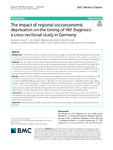2022-03-17Zeitschriftenartikel
The impact of regional socioeconomic deprivation on the timing of HIV diagnosis: a cross-sectional study in Germany
Pantke, Annemarie
Hoebel, Jens
an der Heiden, Matthias
Michalski, Niels
Gunsenheimer‑Bartmeyer, Barbara
Hanke, Kirsten
Bannert, Norbert
Bremer, Viviane
Koppe, Uwe
Background:
HIV infections which are diagnosed at advanced stages are associated with significantly poorer health outcomes. In Germany, the proportion of persons living with HIV who are diagnosed at later stages has remained continuously high. This study examined the impact of regional socioeconomic deprivation on the timing of HIV diagnosis.
Methods:
We used data from the national statutory notification of newly diagnosed HIV infections between 2011 and 2018 with further information on the timing of diagnosis determined by the BED-Capture-ELISA test (BED-CEIA) and diagnosing physicians. Data on regional socioeconomic deprivation were derived from the German Index of Socioeconomic Deprivation (GISD). Outcome measures were a non-recent infection based on the BED-CEIA result or an infection at the stage of AIDS. The effect of socioeconomic deprivation on the timing of diagnosis was analysed using multivariable Poisson regression models with cluster-robust error variance.
Results:
Overall, 67.5% (n = 10,810) of the persons were diagnosed with a non-recent infection and 15.2% (n = 2746) with AIDS. The proportions were higher among persons with heterosexual contact compared to men who have sex with men (MSM) (76.8% non-recent and 14.9% AIDS vs. 61.7% non-recent and 11.4% AIDS). MSM living in highly deprived regions in the countryside (< 100 k residents) were more likely to have a non-recent infection (aPR: 1.16, 95% CI: 1.05–1.28) as well as AIDS (aPR: 1.41, 95% CI: 1.08–1.85) at the time of diagnosis compared to MSM in less deprived regions in the countryside. No differences were observed among MSM from towns (100 k ≤ 1 million residents) or major cities (≥ 1 million residents), and no differences overall in the heterosexual transmission group.
Conclusions:
An effect of socioeconomic deprivation on the timing of HIV diagnosis was found only in MSM from countryside regions. We suggest that efforts in promoting HIV awareness and regular HIV testing are increased for heterosexual persons irrespective of socioeconomic background, and for MSM with a focus on those living in deprived regions in the countryside.
Files in this item

